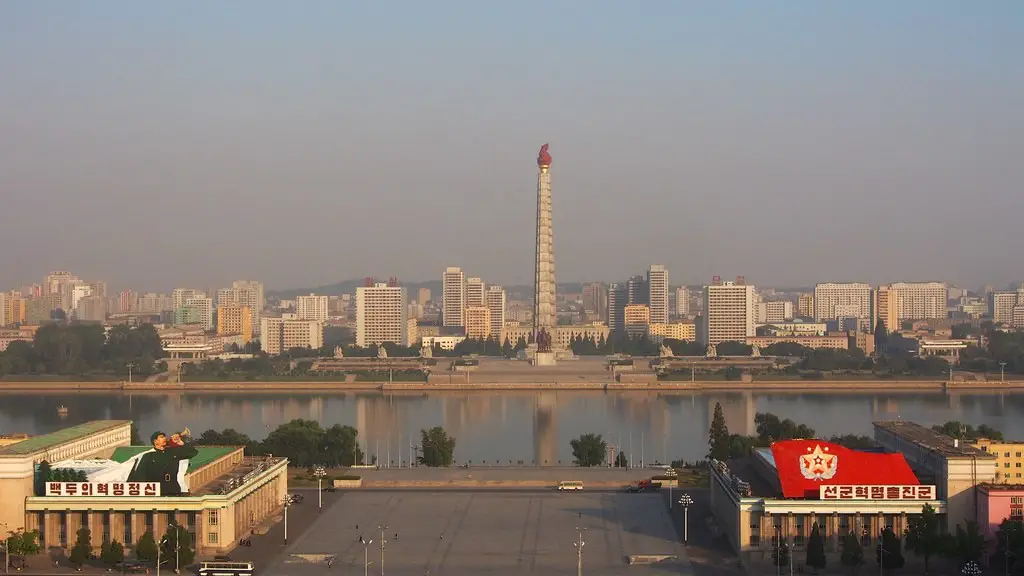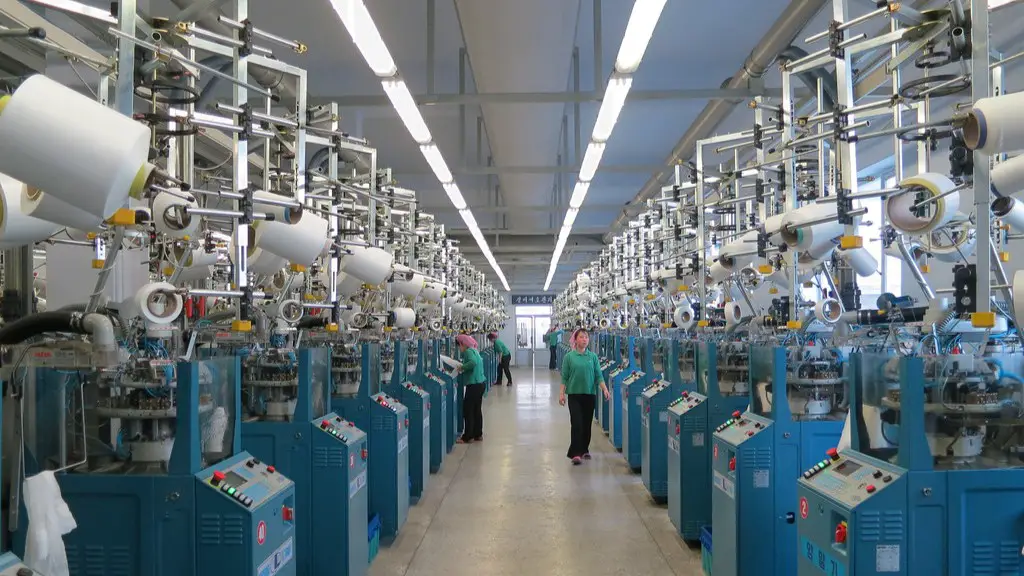Military Strength
North Korea is a militarized state, wielding tremendous power despite its limited population and resources. The North Korean military is comprised of five branches, including the Korean People’s Army, Air Force, Navy, Coast Guard and Strategic Rocket Forces. This military is heavily armed and has impressive capabilities, including some of the world’s deadliest nuclear weapons. North Korea is estimated to possess several hundred missiles, both short and long range, as well as more than 1 million soldiers. It also has access to over 6,500 tanks, 6,000 artillery pieces, and close to 5,000 combat aircraft. The country’s military strength is underscored by its alliances with countries like Russia, China, and Iran, as well as its standing as one of the few countries in the world to possess nuclear weapons.
Political control
The government of North Korea is a powerful one, and it wields its might through its ruling family, the Kims. The current leader, Kim Jong-un, is the son of the late Kim Jong-il and grandson of President Kim Il-sung, the country’s founder. Since coming to power in 2011, Kim Jong-un has further strengthened the country’s control over citizens and visitors by cracking down on dissent, human rights abuses, and other perceived threats to the regime. The country has a policy of ‘Songun’, or ‘military-first’, which places the military at the centre of all decision-making, including economic, political and foreign policy. Moreover, the country’s government is also highly secretive and tightly controlled, denying its citizens access to information, including information about the outside world. These policies have enabled the government to maintain absolute control and to project a sense of power and invincibility.
National Propaganda
Another ingredient to North Korea’s power is the national propaganda and cult of personality that surrounds the Kim family. The government’s messaging relies heavily on idolizing the three generations of the Kim family to rally its people in support of the regime. The Kims are routinely celebrated in mass media, depicted as revered and infallible figures who possess supernatural powers. This messaging has successfully created a cult of personality that binds North Koreans to the country’s leaders and its ideology of juche, or self-reliance. The media also regularly projects a sense of impending crisis and war with the West, which fortifies the notion of a nation under siege by hostile outsiders and that the government is the only means of defense and protection.
Sanctions
Despite its power, North Korea has recently been subject to numerous economic sanctions by the United Nations and other countries as a result of its nuclear activities and other human rights abuses. Despite the sanctions, the country has been able to find ways to maintain a prosperous economy. Through its military-first policy, North Korea has invested heavily in the defence industry, which accounts for a significant portion of its GDP. North Korea has also developed strong ties with China which has provided much of the country’s economic lifeline. The country has used this to its advantage, continuing to ignore external condemnation and sanctions in order to maintain its power.
Isolation
North Korea’s impressive power stems from its isolation from the rest of the world. The country is one of the most isolated and closed-off nations, due in part to its strict “no contact” policy with westerners. North Koreans are rarely allowed to travel abroad, and contact with foreign nationals is strictly monitored. Furthermore, the government heavily censors information that could potentially be damaging or destabilising to the regime. This has enabled the North Korean government to project an image of potency and to demonstrate its ability to withstand outside pressure and criticism.
Geography
North Korea’s geography is conducive to its power as well. Because of its landlocked location, the country has less to worry about when it comes to potential air or sea threats. As a consequence, its military is able to focus more on internal security and put less emphasis on external defense. Additionally, the mountainous terrain of the country serves as a natural defensive barrier, making it difficult for outsiders to penetrate its borders.
Demographics
The population of North Korea also plays a role in its power. This is due to the strength of its military and the large amount of mobilization that it is able to do. With a population of more than 25 million, the country has a vast pool of manpower to draw from, providing it with the necessary resources for military operations and defence. The country also glorifies military service, encouraging citizens to serve in the armed forces, or to enter the local militia, a volunteer force composed of ordinary citizens. The population also tends to look to the government for strength and protection in times of need, providing further support for the regime.
International Support
North Korea also commands respect and has been able to garner the support of many countries, particularly its allies in the region. China and Russia continue to provide the country with economic and military support and have been vocal in their defense of its policies. In addition, the two countries have provided the necessary diplomatic support to prevent further condemnation and international action against North Korea from the United Nations and other international groups.
Nuclear Weapons
Perhaps the most notable part of North Korea’s power is its possession of nuclear weapons. In recent years, the country has accelerated its nuclear program, conducting several underground nuclear tests and launching various ballistic missiles. While the tests and launches have been met with international condemnation, they have proven to be an effective way for North Korea to project its power, forcing the world to take it seriously and to accept its military capabilities.
Coercive Diplomacy
North Korea has also used its military capabilities and the threat of nuclear weapons to its advantage in the diplomatic arena. Through the use of coercive diplomacy and the demonstration of its military might, the country has been able to get what it wants from the international community. By asymmetrically employing its capabilities in this way, North Korea has been able to achieve its goals and increase its power and influence in the international arena.
Geopolitical Leverage
The combination of its military strength, political control, national propaganda and nuclear weapons have enabled North Korea to gain considerable geopolitical leverage in the region. Despite its small size and limited resources, the country has been able to hold its own against its much larger neighbours and use its power to influence regional politics. North Korea’s neighbours have come to view the country as an unpredictable and potentially dangerous actor, and are wary of its potential to cause disruption in the region.
Soft Power
North Korea has also demonstrated its influence through the use of ‘soft power’, or the use of peaceful means such as culture and international diplomacy as a way to gain power. The country has been able to use its well-developed arts and culture to gain support from international audiences, as well as to form relationships with other nations. In recent years, there have been several attempts to open diplomatic channels with the United States, which have been met with resistance from both sides. However, this soft power approach has enabled North Korea to gain some global recognition and respect.
Conclusion
In conclusion, North Korea is a powerful nation that commands respect and fear from its neighbours and the international community. Despite its economic and diplomatic sanctions, the country’s strength is derived from its military capabilities, political control, and cult of personality around the Kim family, as well as its isolation from the outside world. In addition, North Korea has been able to effectively use its nuclear weapons, coercive diplomacy, geopolitical leverage, and soft power to increase its power and influence. Ultimately, North Korea is able to hold its own against much larger and better-armed nations, which stands as testament to its power.



